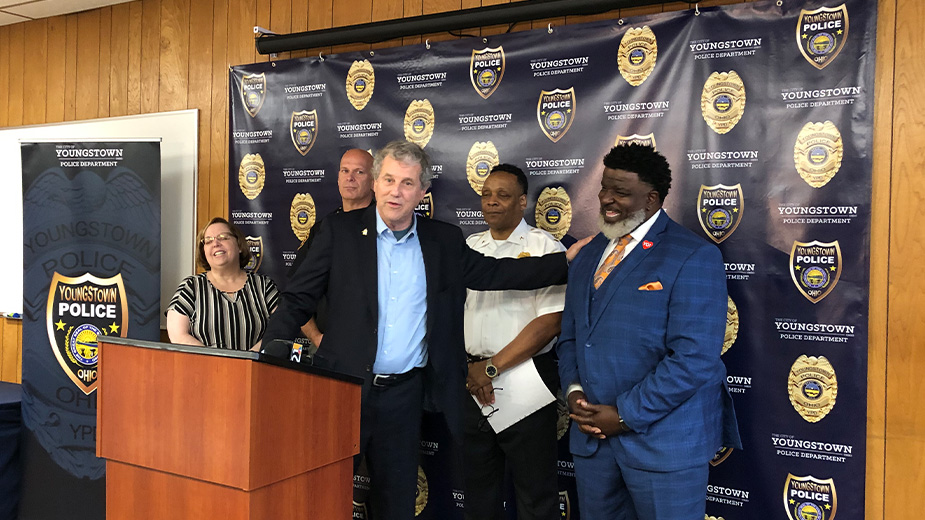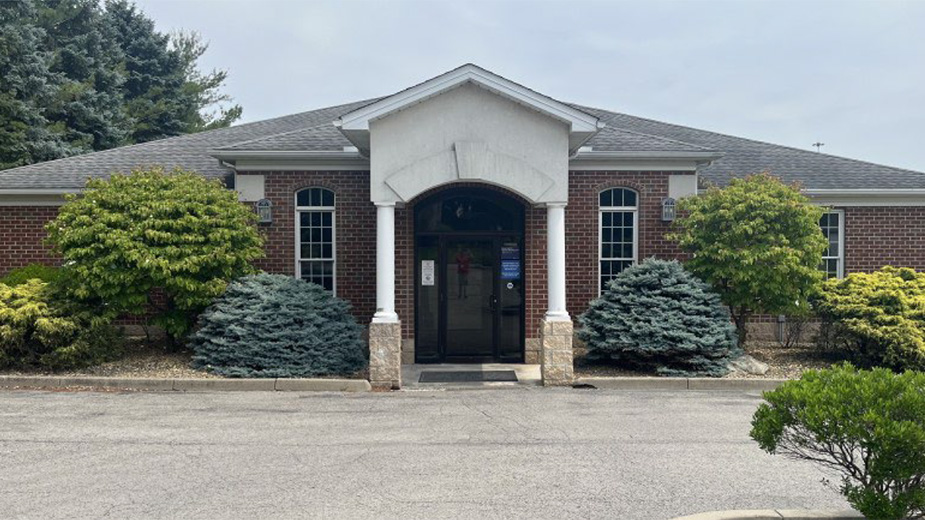Sen. Brown, Local Officials Take Hard Look at Fentanyl Crisis
YOUNGSTOWN, Ohio – From a national level to the local dinner table, the fentanyl overdose crisis has affected people personally and communities overall, and has even deterred national growth.
That is why U.S. Sen. Sherrod Brown, D-Ohio, and others from the Banking, Housing and Urban Affairs Committee he chairs have introduced and support the Fentanyl Eradication and Narcotics Deterrence (FEND) Off Fentanyl Act.
Brown points out 85% of recent overdose deaths in the Mahoning Valley were related to fentanyl, a synthetic opioid that is 50 times more powerful than heroin and is often mixed with other substances, many times without the knowledge of the drug user. Brown said that is typical of the numbers around the country.
In 2021, fentanyl was involved in 80% of Ohio’s deaths from unintentional drug overdoses and linked to nearly two-thirds of the 110,000 overdose deaths in the U.S. in 2022. A Joint Economic Committee congressional report in 2022 stated the opioid addiction and overdose crisis cost the U.S. nearly $1.5 trillion in 2020 and expected that number to rise in 2021.
Although unfamiliar with that report, Brown said it is worth spending money to save lives, keep fentanyl from robbing communities, and to stop money from leaving the national economy and going to criminals internationally.
A 2019 survey by the National Safety Council found that 75% of employers report opioid use has impacted their workplace, according to the National Institute for Occupational Safety and Health.
The U.S. Bureau of Statistics reports that of the 798 workers who died from exposure to harmful substances or environments nationwide in 2021, 464, or 58.1%, of the deaths were attributed to unintentional overdose from nonmedical use of drugs or alcohol.
Youngstown Police Chief Carl Davis notes at the end of 2022, the city had a rash of cases, 486 overdoses reported, including 88 lives lost to overdoses.
“This is a devastating toll that highlights the urgency of this situation,” Davis said. “In response to this crisis, the Youngstown Police Department has implemented various strategies to combat this crisis … including the availability of Narcan, a medication that can reverse the effects of an overdose.”
Davis said the police department has collaborated with other local agencies to saturate high drug and crime areas and to establish hopeyoungstown.org, a platform to help residents caught in cycles of addiction and crime gain control of their lives.
Mahoning County Sheriff Jerry Greene said law enforcement has seen the fentanyl crisis evolve, and local law enforcement needs federal help on the “nonstop” efforts to keep fentanyl from killing more residents in the community.
Task forces have merged efforts on a national, state and local level to share information. It has led to the Stepping UP program to support people dealing with mental health and addiction problems, which Greene said affect about 98% of the people who come to the county jail.
Youngstown Mayor Jamael Tito Brown said there needs to be additional treatment in this area. The first treatment cannot be incarceration, which may help people detox, but does nothing without treatment, he said.
“This definitely cuts into the family dynamic,” Brown said, adding that drugs and addiction lead to loss of jobs, homes and motivation. With fentanyl, ingesting it once can be all it takes to lose a life, and the mayor added that there is an effect on the whole family when “those at the dinner table won’t be at the dinner table because of deaths.”
“We know much of this is about mental health issues, and it’s an all of the above approach to dealing with this terrible scourge of fentanyl deaths and overdose deaths,” Sen. Brown said. “We know it’s about mental health treatment and scaling up treatment programs. We know it’s about empowering local police, including with the tools that they need, funding the tools that they need and safety equipment that they need. We know it’s also about targeting the illicit fentanyl supply chain from the precursor chemical suppliers in China to the cartels that traffic the drug from Mexico.”
Aiming at attacking the fentanyl business with tougher sanctions and anti-money laundering, the FEND Off Fentanyl Act is an effort to target drugs at an international and national level. Brown said the initiative includes going after the bank accounts of criminal syndicates and keeping illegal drug money out of the federal banking system.
When questioned about the southern border situation, Sen. Brown said presidents of both parties have failed to keep the borders strong and keep out drugs and sex trafficking. He suggests sending more federal agents, military, counselors and nurses to stop illegal border crossings. But he said much of the fentanyl doesn’t come across the border but enters the country in various ways.
The FEND Off Fentanyl Act was voted unanimously to the floor from the U.S. Senate’s Banking, Housing and Urban Affairs Committee. Introduced by Brown, ranking member Sen. Tim Scott, R-South Carolina, and the leaders of the Senate Committee on Armed Services, Sens. Jack Reed, D-Rhode Island, and Roger Wicker, R-Mississippi, the bill has more than 60 bipartisan cosponsors. Brown said Thursday he has already spoken with Senate Majority Leader Chuck Shumer, D-New York, about bringing it to the floor quickly, although so far there is not a similar bill introduced in the House.
On Sunday, Sen. J.D. Vance, R-Ohio, appeared on “Meet the Press” and spoke about his own concerns about the fentanyl crisis, especially in Ohio. He discussed possible solutions, including opportunities to increase tariffs and economic pressures on China and Mexico.
Pictured at top: U.S. Sen. Sherrod Brown, center, speaks about a bill to address fentanyl Thursday. Joining him were Brenda Heidinger, Mahoning County Mental Health Board associate director; Mahoning County Sheriff Jerry Greene; Youngstown Police Chief Carl Davis; and Mayor Jamael Tito Brown.
Copyright 2024 The Business Journal, Youngstown, Ohio.



